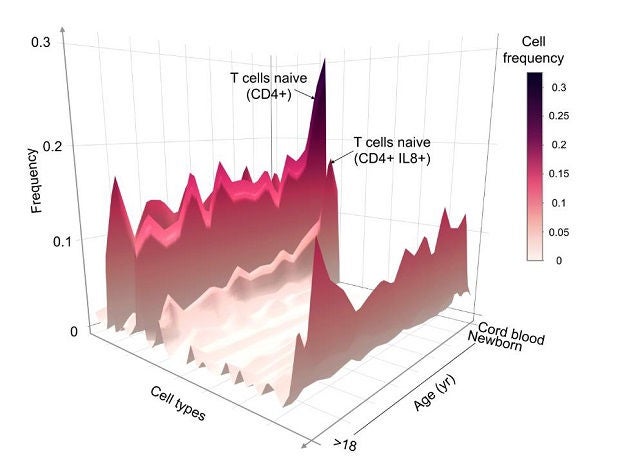
• Interactive web-based tool “EPIC” hosts and analyses comprehensive immune cell data to understand the mechanisms of immunity and how they respond to disease
• EPIC offers new possibilities into the prediction of clinical responses for precision medicine and the development of vaccines and therapies
Singapore, 10 June 2020 – Scientists from the SingHealth Duke-NUS Academic Medical Centre (AMC) have developed an interactive web-based atlas of the human immunome, or genes and proteins that make up the immune system. Known as EPIC (Extended Polydimensional Immunome Characterisation), the atlas hosts a comprehensive, expanding immune cell database ranging from cord blood to adult stages, and can be used by the scientific community worldwide to study the mechanisms of immunity. The team’s efforts were recently published in the prestigious journal Nature Biotechnology.
The immune system is a complex network of cells and proteins and it protects the body against infection and disease. There has always been great interest to study the human immunome and how it works as it holds the key to understanding why individuals respond differently to viruses, therapies and vaccines. Insights into the human immunome enable the development of more effective treatment or new vaccines and therapies.
EPIC will play a role in augmenting or deepening these studies by providing a construct of the immune map and using artificial intelligence (AI) to stratify and analyse data sets, which scientists can access freely. For example, they can use EPIC to explore the whole architecture of the human immunome for different age groups, or analyse specific cell types particular to their specialty or research. EPIC can be used across the basic, translational and clinical research continuums.
Professor Salvatore Albani, Director of the SingHealth Duke-NUS Translational Immunology Institute and principal investigator of the study, said, “The study of the human immunome is akin to taking an MRI of the human body at the cellular level, enabling us to pinpoint what is right or wrong and what we can do to tackle disease. We hope that EPIC, used as a comprehensive dataset and analytical tool of the human immunome, will be able to help clinicians and scientists understand the mechanisms of immunity, predict clinical responses for precision medicine, and even play a part in identifying new vaccines and therapies.” Datasets available in EPIC can be mined to obtain detailed and complete information not only on individual cell subsets, but also on the evolution of the development and maturation of the immune system. This could help clinicians make informed decisions on the most suitable therapeutic choices and identify new targets for novel therapies that can match different immune systems.
EPIC could also speed up the process of finding vaccines. “When developing vaccines, scientists look at immune signatures that can predict the body’s responsiveness to potential vaccines. EPIC can help to identify these signatures much faster, and accelerate the process of vaccine development,” Prof Albani said. In fact, Prof Albani and his team are leveraging EPIC to join the global search for a suitable vaccine for COVID-19.
EPIC is currently used by clinician scientists and researchers to understand diseases such as arthritis, liver cancer and immunological deficiencies. Dr Yeo Joo Guan, Consultant, Division of Medicine, KK Women’s and Children’s Hospital, has been using EPIC to identify potential therapeutic targets and immune signatures associated with poorer clinical outcomes in auto-immune diseases such as Systemic Lupus Erythematosus.
“EPIC is very useful to clinician scientists who use immunological data for their research as it provides a large healthy cytometry dataset and the right tools to analyse them. Its built-in bio-informatics mechanisms allow for the data to be readily interrogated, even by researchers with little computational background. Another uniqueness of EPIC is its dynamic and interactive format of data presentation which enables researchers to look at data from different perspectives whenever new ideas arise,” Dr Yeo said.
Commenting on the importance of the academic medicine partnership between SingHealth and Duke-NUS in advancing the science and practice of medicine, Professor Patrick Casey, Senior Vice Dean for Research at Duke-NUS, said, “The SingHealth Duke-NUS AMC partnership has consistently shown how the intersection of education, research and clinical practice plays a critical role in translating fundamental research into discoveries that ultimately benefit patient care and clinical outcomes. I am confident EPIC, a valuable contribution of the AMC, will be a key resource in the development of new treatment strategies against diseases.”
Prof Wong Tien Yin, Deputy Group CEO (Research & Education), SingHealth said, “Translational research is a long-drawn process that can take up a lot of time and resources, and we are heartened that the SingHealth Duke-NUS AMC can play a part in facilitating this process for the scientific community through EPIC. We look forward to see how EPIC, as an intelligent immune data and analytical tool, can help streamline and accelerate immunological studies and translational research, and pave the way for more clinical breakthroughs.”
EPIC initially started out with only Asian phenotypes but has expanded over time to include immune cell datasets from regional and international sources, including the European Union and United States. It is designed as an open-source tool that is accessible to all researchers, which in turn, allows for anyone to contribute samples, data and new analysis tools.













 Get it on Google Play
Get it on Google Play